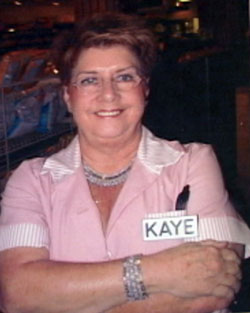 I once went to the most spectacular Hollywood funeral ever. And the love that poured out was well deserved. We knew her by one name, kind of like Cher or Madonna. Kaye. Do you all know whom I’m talking about? You do if you were lucky enough to grow up in Beverly Hills at that time. It’s Kaye Coleman, beloved Nate ‘n Al’s waitress of 38 years and star of our collective childhoods.
I once went to the most spectacular Hollywood funeral ever. And the love that poured out was well deserved. We knew her by one name, kind of like Cher or Madonna. Kaye. Do you all know whom I’m talking about? You do if you were lucky enough to grow up in Beverly Hills at that time. It’s Kaye Coleman, beloved Nate ‘n Al’s waitress of 38 years and star of our collective childhoods.
Although Kaye had a daughter, Sheri, and a son, Michael, she was the unofficial surrogate mother to some of the biggest mothers in Hollywood. And her “sons” looked after her well. I’d run into Kaye at the priciest restaurants, sometimes on Sunday at Matteo’s, in the booth near Sinatra, dining with her posse of waitress friends, the tab picked up by Lew Wasserman or Bernie Brillstein. Those two moguls would also send her on European vacations and Mediterranean cruises. At times, Kaye lived a fancier life than many of her Beverly Hills customers.
At the deli, she was on a first name basis with everyone, including the big agents and the bigger stars, but there was only one “Mr. Wasserman.” She’d be kibitzing with you, then spot Mr. Wasserman walk in and say, “Gotta go, there’s my twenty dollar tip!” Kaye would hit and run with her insults and barbs. She’d give you a tidbit, not finish the story, then walk away quickly leaving you wondering and wanting more. Later on, she’d circle back, finally giving you the punch line. And then she was off again to pick up the next order of Matzoh Brei.


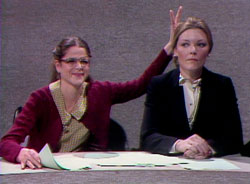 We had just started Saturday Night Live, I was an apprentice writer, 24 years old and I felt intimidated. Chevy was hysterically funny. So was John and Danny and Gilda and Franken. And Michael O’Donoghue, well, Michael O’Donoghue simply scared the shit out of me. So I stayed pretty much to myself. One day I came to work, and on my desk was a framed cartoon. A drawing – no caption – of a drunken rabbi staggering home late and holding a wine bottle. And waiting for him on the other side of the door was his angry wife, getting ready to hit him with a Torah instead of a rolling pin. I had no idea who put it there. I started looking around and out of the corner of my eye I saw a white-haired man in his office, laughing. He had put it there. That was the first communication I had with Herb Sargent– which was significant given that he never spoke and he gave me a cartoon that had no caption.
We had just started Saturday Night Live, I was an apprentice writer, 24 years old and I felt intimidated. Chevy was hysterically funny. So was John and Danny and Gilda and Franken. And Michael O’Donoghue, well, Michael O’Donoghue simply scared the shit out of me. So I stayed pretty much to myself. One day I came to work, and on my desk was a framed cartoon. A drawing – no caption – of a drunken rabbi staggering home late and holding a wine bottle. And waiting for him on the other side of the door was his angry wife, getting ready to hit him with a Torah instead of a rolling pin. I had no idea who put it there. I started looking around and out of the corner of my eye I saw a white-haired man in his office, laughing. He had put it there. That was the first communication I had with Herb Sargent– which was significant given that he never spoke and he gave me a cartoon that had no caption. 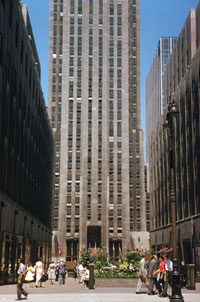 I had seen him years before. Or at least I think I did. When I was a kid. My father manufactured jewelry and he had his shop on 52nd Street between Fifth and Madison. I used to come into the city from Long Island and run errands for him during the summer. And no matter where the delivery was supposed to go, I made sure I got there by going through the lobby of what was then called the RCA Building, 30 Rockefeller Plaza, with the hopes that maybe I would see Johnny Carson (whose show was upstairs) or some of the people from That Was the Week That Was: Buck Henry, Bob Dishy, David Frost – or Herb Sargent, who was the producer. I knew his name from the credits. As a young boy who wanted to be a TV writer some day, this was like hanging around outside of Yankee Stadium waiting to see the players going through to the clubhouse.
I had seen him years before. Or at least I think I did. When I was a kid. My father manufactured jewelry and he had his shop on 52nd Street between Fifth and Madison. I used to come into the city from Long Island and run errands for him during the summer. And no matter where the delivery was supposed to go, I made sure I got there by going through the lobby of what was then called the RCA Building, 30 Rockefeller Plaza, with the hopes that maybe I would see Johnny Carson (whose show was upstairs) or some of the people from That Was the Week That Was: Buck Henry, Bob Dishy, David Frost – or Herb Sargent, who was the producer. I knew his name from the credits. As a young boy who wanted to be a TV writer some day, this was like hanging around outside of Yankee Stadium waiting to see the players going through to the clubhouse. 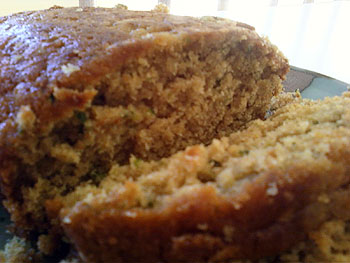 This fall I took a night train ride from Buffalo, New York to Chicago, Illinois. Normally, I find the train relaxing, a chance to rest, read and reflect. On this trip, however, I just wanted to sleep. But the guy sitting behind me snored so loudly that even the usually soothing train sounds couldn’t drown out his volcanic eruptions.
This fall I took a night train ride from Buffalo, New York to Chicago, Illinois. Normally, I find the train relaxing, a chance to rest, read and reflect. On this trip, however, I just wanted to sleep. But the guy sitting behind me snored so loudly that even the usually soothing train sounds couldn’t drown out his volcanic eruptions.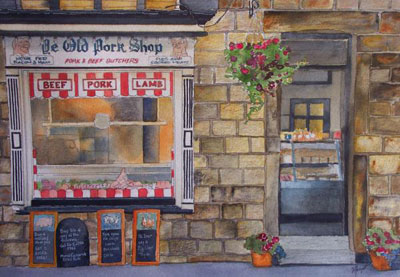 This is a story about Beef Stroganoff. But before your mind wanders to sour cream and Russian Tzars, picture the small kitchen in which it was created. Probably 9 by 9, with a rudimentary stove, a wooden counter which doubled as a chopping board, a hatch leading into a dining room, a single sink with a window facing onto the mountain, with the silver birch trees, where the blueberries and wild strawberries grew in the summer. The larder, where on special occasions gravlaks was made (weighed down with wooden boards and round lead sinkers), was reached via a trap door in the wooden floor, the entrance covered by a red and white rag rug.
This is a story about Beef Stroganoff. But before your mind wanders to sour cream and Russian Tzars, picture the small kitchen in which it was created. Probably 9 by 9, with a rudimentary stove, a wooden counter which doubled as a chopping board, a hatch leading into a dining room, a single sink with a window facing onto the mountain, with the silver birch trees, where the blueberries and wild strawberries grew in the summer. The larder, where on special occasions gravlaks was made (weighed down with wooden boards and round lead sinkers), was reached via a trap door in the wooden floor, the entrance covered by a red and white rag rug.